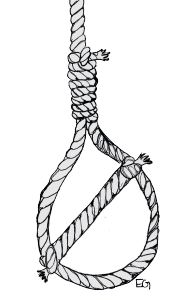On April 8, a federal jury found Dzhokhar Tsarnaev guilty on 30 charges related to his role in the bombing of the 2013 Boston Marathon, an event in which three people were killed and over 250 others were injured. Of those charges, 17 carry the possibility of the death penalty.
There’s really no surprise here. From the beginning, the mountain of evidence tying Tsarnaev to the attack has been indisputable. For 15 days, the prosecution showed the jury an array of disturbing images from the day of the attack and successfully convinced the jurors that Dzhokhar was equally as complicit in the crime as his older brother, Tamerlan. Throw in the facts that Tsarnaev is reported to have confessed soon after his arrest and that his defense team conceded his guilt during the trial’s opening statements, and one wonders whether a trial was even necessary.
It’s no secret that the Department of Justice is pursuing the death penalty for Tsarnaev. United States Attorney General Eric Holder, usually a strong opponent of capital punishment, signed off on the possibility of the death penalty for this trial. His authorization speaks to the still-fresh wounds of the attack, which occurred in such a public setting in America’s most historic city. Massachusetts hasn’t executed a prisoner since 1947 and effectively outlawed the practice in 1984, and yet, the death penalty is very much in play today.
What are the advantages of the death penalty? For many, it’s as simple as an eye for an eye. For others, the death penalty serves as a deterrent for would-be Tsarnaevs, a message that taking American lives will not be tolerated. Finally, many argue that those affected by the trial deserve that level of closure.
I’m not here to argue with those of you who already support the death penalty, because that’s not really going to advance the conversation any further. Personally, I wholeheartedly oppose it, and I’m probably just as stubborn as you are about the issue.
But, to those of you on the fence, please consider the following.
As far as an eye for an eye, the United States justice system is emphatically not based on the ideology. The Constitution and all subsequent laws are far more advanced and thoughtful than this line of thinking, and to pretend that the only way to deliver justice for murder is with state-sanctioned murder—no matter how much more “humane” it is—ignores the basis of this country’s defining document.
As a deterrent, ask Iran, Iraq and Pakistan how effective a policy of executing terrorists has been in discouraging terrorism.
Finally, vis-a-vis closure: we hadn’t had to see Tsarnaev’s face on television or hear his name on the news for a long time until the trial, which went on only because the prosecution refused to accept a plea deal that would have put Tsarnaev in prison for life without the possibility of parole. Now, he’s become a celebrity again, debated about on the news and written about at length. If the death penalty were pursued, this horrible ordeal would continue to drag on for years. If Tsarnaev is dealt life in prison without possibility of parole, this could be finished quickly and quietly. Ask yourself—if Boston residents desire closure, what good would years of appeals do for them?
I think the U.S. is better than the death penalty, and that its utility—if any exists—is easily replicable in other ways. We don’t need another death to move us forward.
Bernstein is a member of
the class of 2018.





